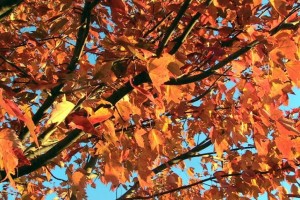The Spirituality of Autumn

“You speak to us, and we will listen; but do not let God speak to us, or we will die.”
Are God and Moses in cahoots, subjecting the Israelites to a good cop/bad cop routine? It certainly seems that way, despite the fact that Moses says to the people, “Do not be afraid; for God has come only to test you and to put the fear of him upon you so that you do not sin.”
“Oh, that’s all God is up to with the thunder and lightning and trumpets and smoke? Whew, I was worried for a second that God was making some demand of us!
God was and God is making some demands, and God speaks to us in a number of ways—none of which will literally kill us, silly Israelites.
However, we misunderstand the Ten Commandments when we pretend that the narrative in which they occur is all about making us follow rules we don’t want to. In this case, the Israelites are learning to survive and thrive together—they’re learning to be a community. Their journey through the wilderness is one of different stages or episodes, and each one helps them to become a more unified people for the purpose of participating in the unfolding God’s kingdom of reconciliation.
The Ten Commandments exist to save us, more than they do to restrict us. Dan Clendenin writes that, “The commandments save us from false covenants and idols that promise so much and deliver so little.”
It would not be too difficult for any of us to make a list of things in our lives that promise us so much while delivering so little. The pursuit of more money or things, the desire for more popularity or control…none of these ground us in reality—the lock us away from the goodness in the world.
If Nietzsche is right, and autumn is more a season of the soul as it is of nature, maybe a good spiritual practice this season might be to shed some of those false covenants and idols as a tree sheds its leaves. After all, who ever said that you can’t repent outside of Lent?
The Rev’d Curtis Farr is the assistant rector of St. James’s Episcopal Church in West Hartford, Connecticut. He offers reflections on the lectionary readings for the upcoming Sunday. He keeps a blog at FatherFarr.com.
